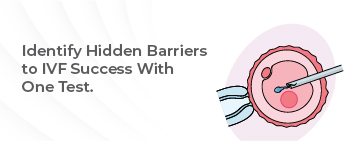Frequently Asked Questions
In Vitro Fertilisation (IVF) is an advanced reproductive technology where eggs from a woman’s ovaries are retrieved and fertilised with sperm in a laboratory. The resulting embryo is then transferred into the woman’s uterus to achieve pregnancy. This procedure is recommended for couples who find it tough to conceive naturally due to several infertility challenges, such as low sperm count, blocked fallopian tubes, ovulation disorders or unexplained infertility.
LifeCell offers a comprehensive panel of diagnostic tests for IVF, including PGT-A (Preimplantation Genetic Testing for Aneuploidies) to detect chromosomal abnormalities and EmbryoScore-niPGT to assess embryo’s health. Apart from these two, LifeCell Diagnostics also offers the Y Chromosome Microdeletion test to check male fertility by identifying genetic defects on the Y chromosome and the Endometrial Receptivity Test (ER-Scope) to find out the most receptive time for embryo transfer.
EmbryoScore niPGT is a non-invasive preimplantation genetic test that analyses free DNA from the embryo culture medium to detect chromosomal abnormalities, unlike traditional PGT-A, which requires a biopsy of cells taken from the embryo. The non-invasive test is gentler on the embryo while still helping identify chromosomal abnormalities in the embryo. While niPGT offers a safer alternative, traditional PGT-A is still widely used and provides comprehensive genetic screening.
Genetic testing helps identify healthy embryos without any specific inherited disorders. Selecting healthy embryos increases the chances of implantation and reduces the risk of miscarriage or birth defects. Healthy embryos also increase the likelihood of a healthy pregnancy. Genetic testing is crucial for couples with a history of genetic conditions or repeated IVF failures.
- The main types of genetic testing performed during IVF are Preimplantation Genetic Testing for Aneuploidies (PGT-A), which checks the embryo for chromosomal abnormalities, and Preimplantation Genetic Testing for Monogenic Disorders (PGT-M), which screens for specific inherited abnormalities carried by one or both parents.
- In some cases, PGT-SR is also performed to detect structural abnormalities in the chromosomes. Advanced non-invasive options like EmbryoScore niPGT are also available to assess embryo health without a biopsy. These tests help to select a healthy embryo, improving the chances of a successful pregnancy.
Before starting IVF, doctors check for key reproductive hormones like FSH (Follicle Stimulating Hormone), LH (Lutenizing Hormone), AMH (Anti-Mullerian Hormone), estradiol (E2), thyroid hormone (TSH, free T4), and progesterone. These tests are essential for evaluating ovulation, egg quality, ovarian reserve, and overall hormonal balance.
Couples are usually advised to undergo a range of fertility tests before undergoing IVF. For women, the tests include hormone tests (FSH, LH, AMH, thyroid), ultrasound scans to check for ovarian reserve and uterine health. For men, the tests include a semen analysis test to assess sperm count, shape and motility. All these tests help doctors evaluate and design a personalised IVF plan for the couple to improve their chances of conceiving.
LifeCell Diagnostics offers a range of IVF diagnostic tests through its official website. Once you have selected the test you need, you can click on ‘Enquire’ or ‘ADD’, depending upon the test. You may be asked to submit your personal details once you click on ‘Enquire’, or you can add the test to your cart and make the payment. A trained technician/paramedic will visit your home, or you may be required to visit one of their diagnostic collection centres, as applicable.
The turnaround time for IVF genetic tests varies depending on the type of test. PGT-A and PGT-M results usually come within 1 to 2 weeks after embryo biopsy. Non-invasive options like EmbryoScore niPGT may provide faster results.





